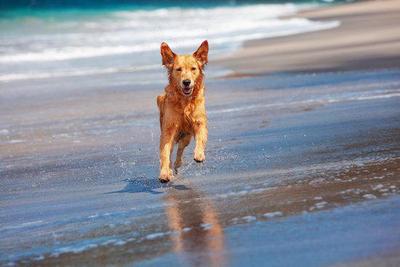🐚 Can Dogs Eat Scallops? The Guide
Possible Health Benefits of Scallops for dogs or toxic? We review
 Scallops being cooked in a pan
Scallops being cooked in a pan
Dog Eat Guide Summary
Do you ever hear people say that dogs and cats can’t eat seafood? Well, they’re wrong! Scallops are an example of completely healthy food for both humans and pets alike.
If you’re looking to add some new treats to your pup’s diet, scallops make a great choice! Just make sure they’re cooked thoroughly (no risk of salmonella) and feed them in moderation (they could get sick). Some dogs may be intolerant to shellfish so keep an eye out,
Why it is healthy for dogs to eat scallops?
There are many benefits associated with feeding your pet this delicious treat. Many people already rave about how good it is for their own diet. So why not get the same benefits and flavour sensation in four-legged goodness right?
Just like us humans (and other meat-eating animals), dogs need protein to survive and thrive. Protein helps them stay strong and is essential for tissue growth and repair. Scallops are packed full of protein!
Good fats and nutrients
While dogs get their energy from fat, they still need to get some dietary fibre. Fibre is essential to keep dogs regular and also helps make them more satiated after eating. As you may know, scallops are very high in dietary fibre–so be ready for increased activity after your dogs eat this treat! 🐶
Aid in joint health 🦴
Scallops can help dogs with arthritis because they’re especially good at soothing the joints. If your dogs suffer from osteoarthritis or another form of arthritis that causes pain in their joints, then adding scallops into their diet will certainly help alleviate that pain and improve mobility overall.
Are Scallops Bad for Dogs?
Although cooked scallops are good for your dog to eat, there can be some negative points or reasons why they shouldn’t eat scallops, these include:
Scallops are a type of shellfish, so dogs who have issues with other types of shellfish may also have problems digesting scallops as well. The best way to tell if your dogs can eat scallops is to try them first and see how their body reacts. If they seem to be doing fine after having some then you should be good to let your dogs have these as a treat from time to time.
It’s also important to remember that dogs can eat scallops, but dogs cannot have the shells because dogs tend to swallow them whole. The shell contains sand and other irritants which will cause dogs problems if they’re allowed to ingest the entire thing at once.
Scallops do not contain any artificial colours or preservatives and they’re very low in fat, which makes this an excellent addition to the diet of dogs everywhere.

Do they contain Salmonella?
Raw scallops can contain parasites, unfortunately, which is why we recommend cooking them before you give them to dogs. They also contain bacteria that can cause salmonella poisoning in dogs. If your dog does eat scallops, it should be cooked first and eaten without any dips/sauces or garnishes.
How to feed scallops to your dogs
If you want to feed your dogs some scallops then it’s best to simply cut off the muscle that holds the two halves of the shell together before giving it to them as a treat or reward. That way you’ll avoid any potential problems with sand, grit, etc… from irritating their stomachs.
As we mentioned above, scallops can help dogs with joint pain because it’s chock full of glucosamine and other nutrients which will keep your dog’s joints healthy.
Scallops are delicious treats for dogs–but remember not to let your dog have too many of these delicious little morsels or else they may put on weight and suffer stomach and intestinal problems. Furthermore, dogs can choke on scallops if dogs eat them whole or ignore the advice to cut them into smaller pieces first!
If dogs manage to ingest a lot of these little guys your dog could develop diarrhoea, vomiting, show signs of depression (such as lack of appetite), and might even go so far as to damage their liver or kidneys due to high levels of histamine.
And dogs with pre-existing asthma may find that they have an attack triggered by the presence of certain molds in scallops. Unfortunately, dogs don’t have any way to tell us when they feel sick–with dogs, it’s up to us owners to look for symptoms such as constant licking at their, watery eyes, etc.
Scallops Benefits
Scallops contain a huge amount of vitamins such as vitamin A, vitamin B12, vitamin D3, vitamin B2 (riboflavin), selenium, phosphorus, and manganese.
✅ Vitamin A
Vitamin A helps dogs maintain healthy teeth & bones, helps dogs with their vision & reproductive system.
✅ Vitamin B12
Vitamin B12 aids dogs in the development of the red blood cells that dogs need to regulate their heart rate and supply oxygen throughout their body.
✅ Vitamin D
Vitamin D is important for dogs because it helps dogs absorb calcium so they have strong bones! Riboflavin/Vitamin b2 helps dogs protect themselves from cell damage by releasing energy from carbohydrates.
✅ Selenium
Selenium is an antioxidant that also contributes to a dog’s immune system helping them fight infections better.
✅ Phosphorus
Phosphorus provides structure to cell membranes within dogs bodies. Magnesium is also something you can get from this shellfish, which helps dogs to repair tissue damage within their bodies.
✅ Protein
Scallops are packed full of protein including a wide array of amino acids for your dog. Protein is important for your dog due to it helps will cell repair and keeping your dog fit and healthy. Protein provides dogs with the necessary energy to live and also helps dogs produce enzymes that assist dogs in digesting their food.
Scallops for dogs is a tasty and safe treat and it will provide your dogs with energy and health benefits!
Can puppies eat scallops?
The answer is yes, puppies can indeed eat scallops, since their digestion system is quite sensitive it’s recommended to not feed too many and make sure they’re cooked thoroughly.
Are raw scallops ok for a dog to eat?
According to studies, there could be a big problem with dogs eating raw scallops. In their raw form, in case you didn’t know, scallops are a type of seafood that comes from the sea, these shellfish are high in protein and low in fat making them a great source of nutrients for dogs.
One possible side effect found when dogs eat raw scallops is diarrhea 💩 because it causes stomach upset even if you cook the scallops first. This could be due to how sensitive dogs digestive systems are, but other symptom’s include vomiting, abdominal pain and fever which may identify an intestinal blockage caused by indigestible parts of meat or shell sometimes left from these foods after cooking.
If dogs are very hungry, they will try to eat anything you bring home or find on there own. Some dogs have been known to eat fish, shrimp, scallops or even lobster when left unattended by an owner walking on a beach.
They’re not a problem for dogs if cooked properly and given as treats occasionally but may upset the dog’s stomach if fed too often. Make sure your dogs do not get any raw seafood shells because of the potential of chemical contamination during the cooking process. They can be kept on the side only to watch while you enjoy yours!
So yes, dogs should not eat raw scallops! If you find your pup trying to sneak some from your kitchen, you’ll need find a better place to store them out of reach from your pooch.
Alternative Food Options
An alternative to scallops for dogs to eat would be a cooked shrimp or a nice grilled white fish filet. A dogs diet should consist of approximately 25% protein and dogs can get a great amount from these options!
Final thoughts - Risks of Shellfish for Dogs
Dogs can enjoy shellfish such as scallops but should only eat them as treats now and then because shellfish like other fish products can cause an upset stomach. As well, dogs may be allergic to certain parts of shellfish such as the muscle (edible part) or digestive system that could lead to stomach problems. It’s best to talk to your veterinarian before giving your dog any kind of seafood or meat product just in case they’re allergic.